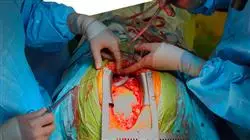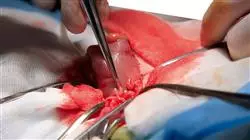University certificate
The world's largest faculty of medicine”
Introduction to the Program
Expand your knowledge of other pancreatic tumors, such as cystic and neuroendocrine tumors, to provide comprehensive and specialized care to your patients”

In recent years, significant advances have been made in the treatment of pancreatic cancer, thanks to the application of new surgical techniques, personalized therapies and the use of technology. However, this pathology remains one of the most lethal diseases, and that is why the update in Pancreatic Oncologic Surgery is of vital importance to improve survival and quality of life of patients.
This TECH Postgraduate certificate in Pancreatic Oncologic Surgery offers a comprehensive update on the subject with a special focus on the pancreas, duodenum and spleen. This program is designed to provide professionals with a broad and detailed view of the epidemiological, risk and genetic factors of pancreatic cancer, as well as the most innovative surgical techniques for its treatment.
Advances in imaging technology, such as positron emission tomography (PET-CT) and magnetic resonance imaging, have improved the early detection of pancreatic cancer, allowing earlier and more effective surgical intervention. In addition, robotic and laparoscopic surgery are techniques that are increasingly used for the removal of pancreatic tumors, which reduces the risk of complications and speeds up the patient's recovery.
All of this will be discussed in depth in this syllabus, which also addresses the most effective therapeutic strategies for pancreatic cancer, according to the NCCN classification. Neoadjuvant and adjuvant are personalized therapies used to reduce the size of the tumor prior to surgery, and improve the effectiveness of treatment. Radiotherapy and chemotherapy are complementary therapeutic options used to treat metastatic pancreatic cancer.
Being completely online, it offers the possibility of studying from any digital device of your preference, so the specialist will decide from where, how and when to do it. Taking advantage of the multiple audiovisual resources and the most effective learning methodology: Relearning.
You will study the epidemiological, risk and genetic factors of pancreatic cancer, in order to offer a more accurate and personalized diagnosis and treatment to your patients”
This Postgraduate certificate in Pancreatic Oncologic Surgery contains the most complete and up-to-date scientific program on the market. The most important features include:
- The development of practical cases presented by experts in Oncologic Digestive Surgery
- Graphic, schematic, and practical contents with which they are created, provide scientific and practical information on the disciplines that are essential for professional practice
- Practical exercises where the self-assessment process can be carried out to improve learning
- Its special emphasis on innovative methodologies
- Theoretical lessons, questions to the expert, debate forums on controversial topics, and individual reflection assignments
- Content that is accessible from any fixed or portable device with an Internet connection
With the online study system, you will be able to access the course content from any device and at any time, adapting it to your rhythm of life and schedules”
The program’s teaching staff includes professionals from sector who contribute their work experience to this educational program, as well as renowned specialists from leading societies and prestigious universities.
Its multimedia content, developed with the latest educational technology, will provide the professionals with situated and contextual learning, i.e., a simulated environment that will provide an immersive education programmed to learn in real situations.
The design of this program focuses on Problem-Based Learning, by means of which the professionals must try to solve the different professional practice situations that are presented throughout the academic course. For this purpose, the students will be assisted by an innovative interactive video system created by renowned experts.
Discover the most effective therapeutic strategies for each type of pancreatic tumor, according to the NCCN classification”

Delve into the most effective surgical techniques to treat pancreatic cancer, including minimally invasive techniques such as robotic surgery”
Why study at TECH?
TECH is the world’s largest online university. With an impressive catalog of more than 14,000 university programs available in 11 languages, it is positioned as a leader in employability, with a 99% job placement rate. In addition, it relies on an enormous faculty of more than 6,000 professors of the highest international renown.

Study at the world's largest online university and guarantee your professional success. The future starts at TECH”
The world’s best online university according to FORBES
The prestigious Forbes magazine, specialized in business and finance, has highlighted TECH as “the world's best online university” This is what they have recently stated in an article in their digital edition in which they echo the success story of this institution, “thanks to the academic offer it provides, the selection of its teaching staff, and an innovative learning method aimed at educating the professionals of the future”
A revolutionary study method, a cutting-edge faculty and a practical focus: the key to TECH's success.
The most complete study plans on the university scene
TECH offers the most complete study plans on the university scene, with syllabuses that cover fundamental concepts and, at the same time, the main scientific advances in their specific scientific areas. In addition, these programs are continuously being updated to guarantee students the academic vanguard and the most in-demand professional skills. In this way, the university's qualifications provide its graduates with a significant advantage to propel their careers to success.
TECH offers the most comprehensive and intensive study plans on the current university scene.
A world-class teaching staff
TECH's teaching staff is made up of more than 6,000 professors with the highest international recognition. Professors, researchers and top executives of multinational companies, including Isaiah Covington, performance coach of the Boston Celtics; Magda Romanska, principal investigator at Harvard MetaLAB; Ignacio Wistumba, chairman of the department of translational molecular pathology at MD Anderson Cancer Center; and D.W. Pine, creative director of TIME magazine, among others.
Internationally renowned experts, specialized in different branches of Health, Technology, Communication and Business, form part of the TECH faculty.
A unique learning method
TECH is the first university to use Relearning in all its programs. It is the best online learning methodology, accredited with international teaching quality certifications, provided by prestigious educational agencies. In addition, this disruptive educational model is complemented with the “Case Method”, thereby setting up a unique online teaching strategy. Innovative teaching resources are also implemented, including detailed videos, infographics and interactive summaries.
TECH combines Relearning and the Case Method in all its university programs to guarantee excellent theoretical and practical learning, studying whenever and wherever you want.
The world's largest online university
TECH is the world’s largest online university. We are the largest educational institution, with the best and widest online educational catalog, one hundred percent online and covering the vast majority of areas of knowledge. We offer a large selection of our own degrees and accredited online undergraduate and postgraduate degrees. In total, more than 14,000 university degrees, in eleven different languages, make us the largest educational largest in the world.
TECH has the world's most extensive catalog of academic and official programs, available in more than 11 languages.
Google Premier Partner
The American technology giant has awarded TECH the Google Google Premier Partner badge. This award, which is only available to 3% of the world's companies, highlights the efficient, flexible and tailored experience that this university provides to students. The recognition as a Google Premier Partner not only accredits the maximum rigor, performance and investment in TECH's digital infrastructures, but also places this university as one of the world's leading technology companies.
Google has positioned TECH in the top 3% of the world's most important technology companies by awarding it its Google Premier Partner badge.
The official online university of the NBA
TECH is the official online university of the NBA. Thanks to our agreement with the biggest league in basketball, we offer our students exclusive university programs, as well as a wide variety of educational resources focused on the business of the league and other areas of the sports industry. Each program is made up of a uniquely designed syllabus and features exceptional guest hosts: professionals with a distinguished sports background who will offer their expertise on the most relevant topics.
TECH has been selected by the NBA, the world's top basketball league, as its official online university.
The top-rated university by its students
Students have positioned TECH as the world's top-rated university on the main review websites, with a highest rating of 4.9 out of 5, obtained from more than 1,000 reviews. These results consolidate TECH as the benchmark university institution at an international level, reflecting the excellence and positive impact of its educational model.” reflecting the excellence and positive impact of its educational model.”
TECH is the world’s top-rated university by its students.
Leaders in employability
TECH has managed to become the leading university in employability. 99% of its students obtain jobs in the academic field they have studied, within one year of completing any of the university's programs. A similar number achieve immediate career enhancement. All this thanks to a study methodology that bases its effectiveness on the acquisition of practical skills, which are absolutely necessary for professional development.
99% of TECH graduates find a job within a year of completing their studies.
Postgraduate Certificate in Pancreatic Oncologic Surgery
Pancreatic oncologic surgery is a type of surgery used for the treatment of pancreatic cancer. This type of surgery focuses on removing the cancerous tumor, as well as any tissue or organs affected by the disease. At TECH Global University we have this specialized program designed to provide surgeons with specialized knowledge and skills in the diagnosis, treatment and management of oncological diseases of the pancreas. Special attention will be given to the study of the anatomy, physiology and pathology of the pancreas, as well as the various surgical techniques used for the treatment of pancreatic cancer.
The aim of this program is to provide surgeons with specialized education and training in pancreatic oncologic surgery to improve both the quality of their outcomes and patient care. In addition pancreatic oncologic surgery also involves planning and coordinating comprehensive treatment that may include radiation therapy, chemotherapy, target therapies and other therapeutic approaches. Practitioners engaged in pancreatic oncologic surgery must stay abreast of the latest advances in research and treatment, and work in multidisciplinary teams to provide the best care for patients with pancreatic cancer.







